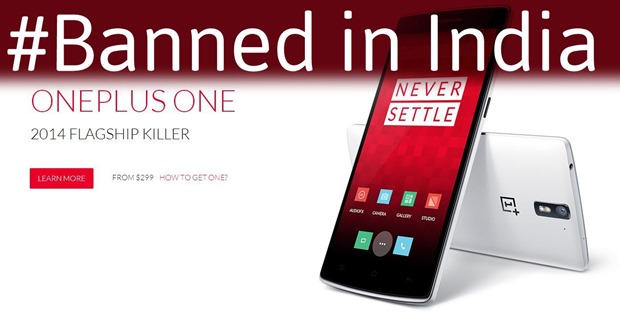Ban Fest Continues. After Xiaomi & Uber, OnePlus Too Banned by the Delhi HC

It is now official. December 2014 has been declared the “Ban Month”.
After Xiaomi was slapped with a ban after a patent tussle with Ericsson and Uber was banned in some parts of the country following a rape by one of their cabbies, it is now the Chinese smartphone manufacturer OnePlus’ turn to be banned.
Though Xiaomi just managed to get some relief, OnePlus has been banned by the Delhi High Court following a petition by the Gurgaon based manufacturer Micromax, in which the latter has accused the Chinese company of infringing upon their exclusivity agreement with Cyanogen.
As a result of this ban, OnePlus will not be allowed to import, market or sell Cyanogen branded smartphones within the Indian borders though the court has allowed the online retailer Amazon.in to clear its stock.
The High Court order came after Micromax sought to restrain OnePlus from infringing upon its exclusive rights with the American software manufacturing company Cyanogen. The U.S. based developer specializes in the modification of Android operating system. They had earlier entered into an agreement with Micromax wherein the latter was given the exclusive license to integrate and distribute Cyanogen technology as a part of its devices within the Indian shores.
Micromax claimed that it had “incurred major expenses for creation of a brand exclusivity for providing to Indian customers mobile phones with Cyanogen operating systems” and “it would suffer irreparable harm and loss if the defendants (OnePlus) are permitted to continue with their illegal acts in violation of the agreement between Micromax and Cyanogen”.
On its part, OnePlus claims to have signed an agreement with Cyanogen for using and distributing their technology anywhere in the world except mainland China in February 2014, and that they had been told about the termination of this agreement just a week before their latest handset’s India launch.
What does that imply?
Now, while Micromax has the exclusive license for South Asia, OnePlus has a non-exclusive license for the whole world except China. While Cyanogen has declined to comment on the matter, they have clarified that their agreement with Micromax supersedes all previous agreements.
While the Micromax plea does make some sense, I cannot but help notice the timing of the ban.
The ban on Xiaomi last week had come just ahead of the GOSF. For a hugely popular handset that is sold exclusively online, that came as a huge setback. Strangely enough, the court revised its appeal shortly after the online selling fest came to an end and the company was allowed to import and sell phones powered by Qualcomm processors, meaning thereby that they were allowed to go ahead with the sale of their 4G model Redmi Note, 1S and the soon to be launched MI4.
Now, the ban on Redmi Note which is gaining popularity among Indian smartphone users for the giant screen and amazing features at a very reasonable price comes just ahead of the launch of Micromax YU on December 18. Surely, the timing of both these bans could not be a mere coincidence?
Anyone following the tech buzz would have known that the exclusivity agreement between Cyanogen and Micromax would affect OnePlus. What we had not anticipated however was a blanket ban on the use of this technology, though non-availability of updates was seen as a distinct possibility.
If this is how the Indian courts are going to slap bans on sale of handsets by any company, major international players might start avoiding the Indian market altogether, inspite of the huge size and opportunity window present here.
Do you think the timing of the ban is doctored to suit the Indian manufacturer’s proposed launch of YU range? And whether the Chinese manufacturer should be made to pay the penalty for Cyanogen entering into an exclusivity agreement nearly seven months after allowing OnePlus to use their technology?

[…] and undeterred by the recent High Court ban on the import and sales of OnePlus phones in India, Chinese phone maker Shenzhen OnePlus Technology Co. Ltd has made it clear that they will […]
Good opportunity for Micromax to increase their business……
I did not understand “timing of the ban is doctored”. Xiaomi and OnePlus issues are completely different. While Xiaomi’s ban was due to Ericssion’s patent infringement, the OnePlus’s ban is because of Cyanogen OS.
I believe, OnePlus should drop Cyanogen and should come up with vanilla Android or near to that, just like Moto and Nexus devices. Believe me, it would gain more popularity. And forget about YU devices, MMX is afraid of Asus, Xiaomi and other brands offering high quality devices at competitive price so there won’t be takers for MMX devices in future except for rural areas where people don’t have much exposure to online shopping and latest trends.
This is sad, OPO is such a great device and its ban in India will be disappointing